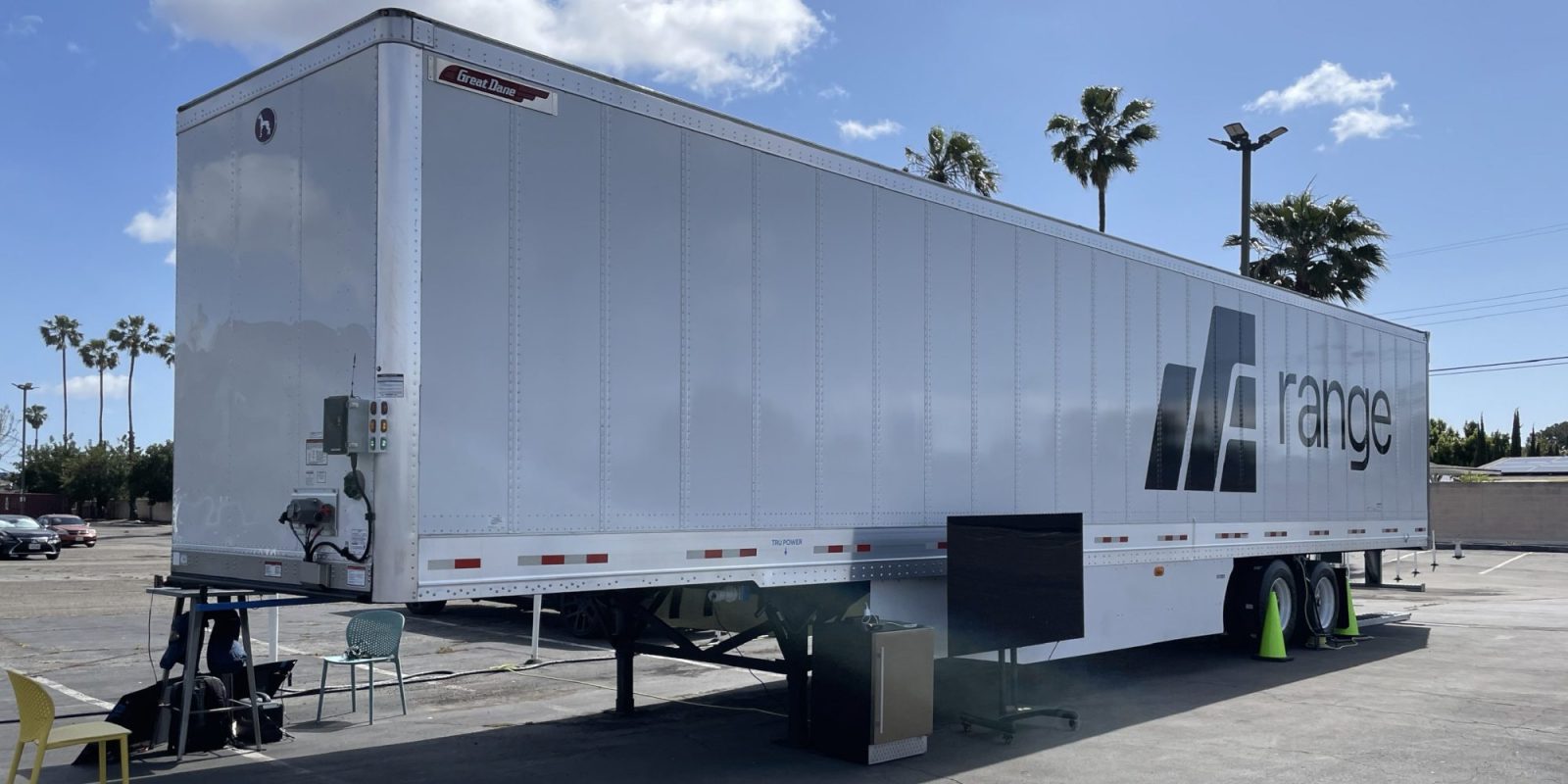
Range Energy’s electric trailer, which can “electrify” a diesel semi truck just by adding a trailer, has been found to improve efficiency by 36% in independent testing.
We covered Range Energy’s trailer back in May when we saw it at ACT Expo, the largest expo for advanced fleets.
As a quick refresher, the basic idea is that the trailer has a battery and motors in it and can sense acceleration through the trailer’s kingpin. When the tractor pulls forward, the motors kick in to help carry the load, meaning the tractor doesn’t have to do as much pulling.
This means that a truck can be “electrified” without having to modify the truck at all – just attach a Range trailer with built-in electric propulsion and you’ve effectively turned a diesel tractor into a plug-in hybrid of sorts. Or, attach it to an electric tractor and you can extend range as well.
We had a demo of a dummy trailer at ACT Expo and frankly, it was the coolest demo I’ve ever had at a media event. I went from having a hard time pulling the trailer to being able to do it with one finger, and it was responsive enough that I really just felt like Superman.
Now, Range has undergone independent testing on its trailer to validate its efficiency claims, finding a 36% improvement (+3.25mpg, based on a 9mpg baseline). This was done on a 25-mile urban/high loop at 60mph top speeds and approximately 59k gross vehicle weight (so about half of the maximum trailer weight).
Testing was done by Mesilla Valley Transportation Solutions, a fuel economy consultant for the trucking industry which has validated many technologies, most of which give single-digit percent efficiency gains.
So, 36% is a pretty huge improvement compared to all of those. Which makes sense – none of the other technologies tested provide their own propulsion, just aerodynamic improvements.
“We were impressed with the Range trailer. Whether a fleet wants to reduce fuel usage or increase BEV range, this system provides unique opportunities over a traditional trailer – and by a large amount when considering it achieved 36.3% fuel savings. Our drivers also liked the Range trailer; reporting it pulled easier and felt lighter. Naturally, there is a trade-off with electric charging and additional weight so it may not suit every fleet but for those considering the EV direction, Range is worth talking to.”
Daryl Bear, COO, MVT Solutions.
MVT used a diesel tractor, so we don’t know if the same improvements would happen for an electric truck – they would likely be close, but given that the electric truck already has regenerative braking, range gains might be a little lower than the 36% diesel efficiency gains.
Range Energy isn’t the only company doing something similar. Since we saw the Range trailer, we also heard about BMW doing the same thing in Europe with a trailer by Trailer Dynamics. Their solution has a much larger battery and claims higher efficiency gains, but it’s hard to compare the gains directly given the differences in testing regimens, regional shipping patterns and so on.
Range’s solution is not yet commercially available, but claims that production will ramp starting next year.
Electrek’s Take
The one issue with these tests is that the press release includes the words “up to” when describing the gains, and those words may be doing some heavy lifting. We’re curious to hear what circumstances work better or worse for the trailer, and what kind of average real-world gains can be gotten across a variety of fleets.
Other than that, I really like Range’s solution, because even though it doesn’t necessarily make trucks “all-electric” right off the bat, it does offer a much faster and easier way to electrify for many fleets.
Electric trucks are still quite expensive upfront, and while they offer extremely impressive benefits in terms of running costs, smaller operators can have a hard time fronting the money to convert to electric. While Range’s solution will certainly not be cheap either, it may offer an easier way to improve a fleet’s efficiency quickly.
My worry is that the market for Range’s solution will disappear over time. There is a lot of potential market to quickly electrify diesel tractors by adding a trailer, but as more and more electric trucks become available, there will be less and less need for Range’s trailer.
The “range extending” function might still be useful in some circumstances (e.g. medium-to-long-haul electric trucking of low weight and high volume items), but it still seems like a transitional solution rather than a permanent one. Especially with the rapid shift to electrification coming in trucking, led by California’s strong new trucking regulations.
So, Range just has to get to market and ramp up quick, both because it will offer immediate efficiency and clean air gains, and because the business might only have a limited time before it loses some of its relevance while electric trucks start to take over the industry.
